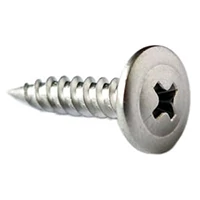Comprehensive Guide to Pricing for Countersunk Flat Head Self-Drilling Screws
Understanding Countersunk Flat Head Self-Drilling Screws A Comprehensive Guide to Pricing
When it comes to construction, woodworking, or any projects that require fastening materials together, screws are an essential tool. Among the various types available in the market, countersunk flat head self-drilling screws stand out for their unique design and versatility. This article delves into what these screws are, their applications, and an overview of the pricing landscape.
What are Countersunk Flat Head Self-Drilling Screws?
Countersunk flat head self-drilling screws are screws designed with a flat head that sits flush with the surface of the material after installation. The countersunk feature allows the screw to sink into the material, providing a clean finish that not only improves aesthetics but also reduces the risk of snagging. The self-drilling capability eliminates the need for pre-drilling holes, thus saving time and effort during installation.
These screws are typically made from high-strength materials such as stainless steel or carbon steel, ensuring durability and resistance to corrosion. Their drilling tip allows them to create their own pilot holes, making them ideal for a variety of applications, particularly in metal and wood.
Applications
The versatility of countersunk flat head self-drilling screws makes them ideal for numerous applications. They are commonly used in
1. Construction For fastening metal sheets and frames. 2. Furniture Assembly Ideal for creating a seamless look with flat surfaces. 3. Roofing Used to attach metal roofing sheets securely. 4. Automotive Common in assembling different components without the need for additional drilling. 5. Decking and Fencing Providing both structural integrity and a polished appearance.
Given their ability to blend into surfaces and their robustness, these screws are a favorite among builders and DIY enthusiasts alike
.countersunk flat head self drilling screw pricelist

Pricing Landscape
The pricing of countersunk flat head self-drilling screws varies significantly based on several factors, including size, material, brand, and the quantity purchased. Here’s a breakdown of what influences their price
1. Material Stainless steel screws tend to be more expensive than carbon steel ones due to their corrosion resistance and longevity. 2. Size and Thread Count Larger screws or those with finer threads often come at a higher price. The specific needs of a project will dictate the right size and type of screw required.
3. Quantity Buying in bulk typically reduces the cost per unit. Suppliers often provide discounts for larger purchases, which is advantageous for contractors and builders who use these screws in mass quantities.
4. Brand Renowned brands often charge a premium for their products, but this can be justified by quality assurance and reliability.
5. Market Fluctuations Prices may fluctuate based on the overall market demand for these screws, which can be influenced by regional construction booms or trends in DIY projects.
As of the latest pricing data, countersunk flat head self-drilling screws can range from as low as $0.05 each for basic models in bulk to as high as $0.50 or more for specialized, high-strength varieties.
Conclusion
Countersunk flat head self-drilling screws are an indispensable tool in various fields thanks to their unique features and adaptability. Understanding the factors that affect their pricing can help consumers make informed choices, ensuring they get the best value for their projects. With the right screws in hand, crafting robust and aesthetically pleasing projects becomes a seamless endeavor. Whether you are a professional contractor or an enthusiastic DIYer, investing in quality screws will significantly impact the success of your work.
-
Top Choices for Plasterboard FixingNewsDec.26,2024
-
The Versatility of Specialty WashersNewsDec.26,2024
-
Secure Your ProjectsNewsDec.26,2024
-
Essential Screws for Chipboard Flooring ProjectsNewsDec.26,2024
-
Choosing the Right Drywall ScrewsNewsDec.26,2024
-
Black Phosphate Screws for Superior PerformanceNewsDec.26,2024
-
The Versatile Choice of Nylon Flat Washers for Your NeedsNewsDec.18,2024










